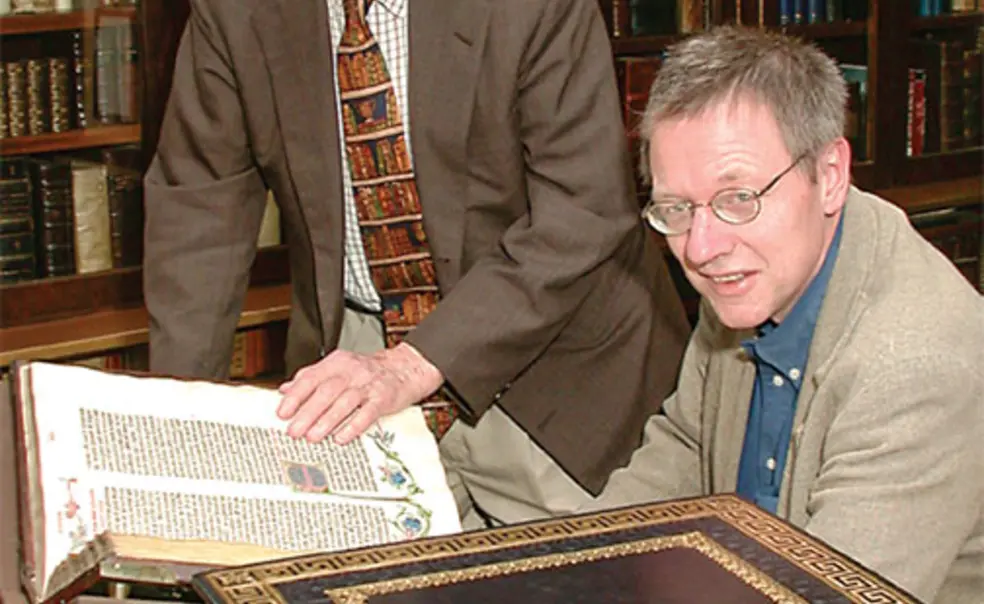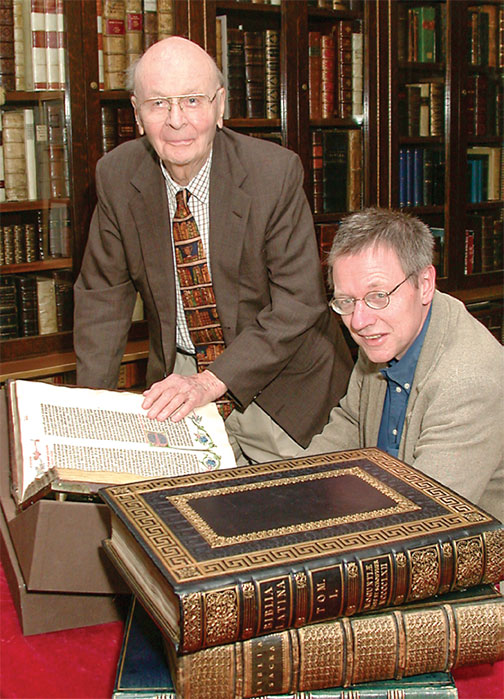The Scheide Library: A Defining Collection
In 1865, 18-year-old William T. Scheide — a railroad employee who would soon find his fortune in the oil business — wanted to explore The Chemical History of a Candle, a volume of lectures by British chemist and physicist Michael Faraday, one of the great science popularizers of his day.
Scheide’s purchase of an 1861 copy of Faraday’s lectures satisfied his intellectual curiosity and also marked the start of an astounding collection of rare books and manuscripts that today stands at the heart of Princeton’s Firestone Library. Thanks to the generosity of its founder’s grandson, the devoted Princetonian William H. (Bill) Scheide ’36, we can now proudly call the Scheide Library a permanent part of the University’s collections.
This donation is remarkable not only because its estimated $300 million value makes it the largest gift in Princeton’s history, but more fundamentally because it enables us to uphold our commitment to the humanities and liberal arts education. The Scheide Library has benefited students and scholars since it came to Firestone on loan from Bill in 1959, and will now continue to do so for future generations. Questions raised and discoveries made through studies of the 2,500 items housed in the Scheide Library will inform endeavors ranging from freshman writing seminars to senior theses to major works by senior scholars in the years to come.
The Scheide Library is a spectacular resource, with famed cornerstones including the first six printed editions of the Bible; Shakespeare’s earliest folios; the original printing of the Declaration of Independence; manuscripts of Bach, Mozart, and Beethoven; and the Blickling Homilies, the only substantial Old English manuscript in America. The collection was meticulously assembled and curated by Bill, his father John H. Scheide 1896, and his grandfather. The Scheides were passionate about obtaining works based on their scholarly value, and as a result their holdings are in some areas fully comparable to the great collections of national libraries in Europe that were formed over hundreds of years.
Bill himself was an extraordinary and modest gentleman, and a truly dedicated and wise scholar who was renowned across and beyond campus for his broad support of the arts, humanities, and social justice. A musician and musicologist, he made major contributions to our music department, supported the University Art Museum and humanities programming, and helped hundreds of students attend Princeton as Scheide Scholars. And his enthusiasm for adding scholarly jewels to the Scheide Library was inexhaustible. Just five months before he passed away in November at age 100, Bill made his final purchase for the library — a bound volume of tractates by St. Augustine published in 1467 by Ulrich Zell, the first printer of Cologne, Germany.
The spirit of discovery and the intellectual breadth that undergird the Scheide Library make it a defining collection for Firestone Library and for the University — reflecting our distinctive emphasis on providing undergraduates with a broad liberal arts education and a rigorous, independent research environment. We are in the midst of a multi-year renovation of Firestone to enhance its ability to serve as a laboratory for the humanities and social sciences for our students and scholars. As part of the renovation, the Scheide Library will move to another floor, but its design will remain modeled upon John Scheide’s personal library, as his son wished.
We are grateful not only to Bill Scheide, but to other generous alumni whose contributions to our library collections have provided abundant resources for our students and scholars. Among many others, Lloyd Cotsen ’50 has donated his international collection of illustrated children’s literature from the 15th century to the present; Leonard Milberg ’53 has given to Princeton collections of modern American poetry, Irish poetry and prose, and Jewish American literature; and Sid Lapidus ’59 has donated his collection of rare American Revolution-era books, pamphlets, and prints. By making their thoughtfully assembled literary and historical treasures available for intellectual exploration, our alumni enable Princeton to live up to our mission of providing students with transformative educational experiences and empowering our scholars to reveal fundamental truths about humankind.
Our library staff is working diligently to digitize many rare book and manuscript collections — including the Scheide Library — to expand access to these magnificent holdings. Bill Scheide firmly believed in giving those who were interested in studying his collection the opportunity to share in his sense of discovery and wonder. We are fortunate as a University, and as a society, to have Princeton alumni like Bill who have been such stalwart caretakers of our past and of our future.













No responses yet